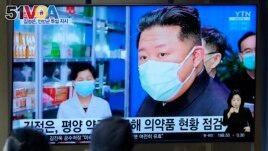16 May 2022
North Korea is reporting widespread disease and at least 50 deaths related to a "fever" for the first time during the COVID-19 pandemic.
North Korean health officials released details Monday. They said over 1.2 million people had been sickened by an unidentified fever since late April through May 15. More than half a million people were under medical treatment, the government reported, and more than 600,000 others had recovered, it said.
Fever is well-known as a symptom of the new coronavirus.

In this photo provided by the North Korean government, North Korean leader Kim Jong Un, center, visits a pharmacy in Pyongyang, North Korea Sunday, May 15, 2022. The image is a photo from television.
While most of the world has been living under COVID-19 emergency conditions since 2020, North Korea reported the presence of the virus for the first time on Friday.
Monday's announcement said the number of confirmed COVID-19 patients had risen to at least 168, North Korean state television KCTV said, belatedly reporting counts registered through 6 p.m. Saturday.
On Thursday, North Korean leader Kim Jong Un wore a protective face covering in public for likely the first time during the COVID crisis.
During a government meeting Sunday, Kim sharply criticized officials as too slow in getting medicine to those in need. He has called for maximum preventive efforts, including restricting people to their homes and limiting movement between cities. And, he ordered the military to help in effort to contain the disease.
Of the 50 deaths, only one has been officially reported as coming from COVID-19.
Kim said the sickness is causing "great upheaval." Upheaval is another word for difficulty and disorder.
North Korea experts said if Kim's government is admitting over 1.2 million sick people, it is possible the number is much higher. They say the country probably does not have strong testing and reporting systems in place to know the true count.
Dr. Poonam Khetrapal Singh is the World Health Organization's director for Southeast Asia. Because North Koreans are not vaccinated, he said, the virus will continue to spread "rapidly" unless restrictions are put in place "immediately."
North Korean state media say over 500,000 people are in quarantine, which means they are not permitted to move freely.
Both China and South Korea offered medical help, but it is unclear whether Kim will accept it.
Nam Sung-wook is a professor at Korea University in South Korea. He said North Korea will likely try to "protect the dignity" of its top leader by reporting deaths as coming from natural causes or overwork.
Jung Jae-hun is a professor of preventive medicine at South Korea's Gachon University. Jung said death counts will likely increase in coming weeks. Another analyst, Cho Han Bum of South Korea's Institute for National Unification, said the total deaths may be an "outright lie." He noted that South Korea recently reported 25,000 new cases and 48 deaths.
At the same time Kim Jong Un criticized health officials, he also said North Korea's economy must continue to operate. As a result, some believe there may continue to be large gatherings of workers at farms, factories and building sites.
While many experts thought the virus was probably present in North Korea before this, it is hard to know for sure. They say a closed border and heavy restrictions may have prevented the spread until now.
In South Korea, president Yoon Suk Yeol offered vaccines and medicines but said the North had not yet asked for help.
North Korea also refused offers from the United Nations to send the vaccines from the COVAX program, likely because the vaccines required international monitoring.
I'm Dan Friedell.
Dan Friedell adapted this story for VOA Learning English based on reporting by the Associated Press and VOA.
Write to us in the Comments Section and visit 51VOA.COM.
________________________________________________
Words in This Story
maximum– adj. the highest amount that is possible
belated – adj. coming late
symptom – n. a change in the body that indicates disease is present
rapid- adj. happening very fast
dignity – n. the quality of being worthy of honor or respect